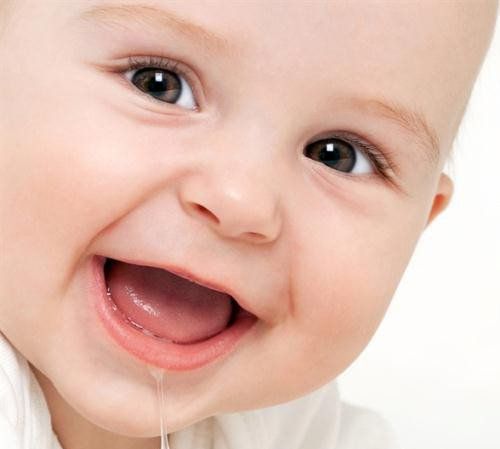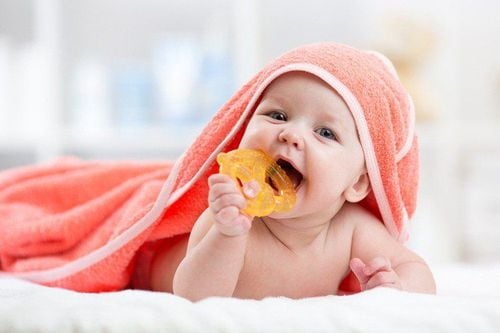This is an automatically translated article.
From when your child gets his or her first tooth to how much it hurts, teething is a different experience for every child. Here's how to spot the signs of teething so you can figure out the best way to treat the discomfort
1. Signs and symptoms of teething in children
Common signs and symptoms of baby teething when teething are:
1.1. Difficulty sleeping, disturbed sleep Teething can be a painful process and this can keep your baby up at night. So if your baby is suddenly finding it difficult to settle down and rest, teething could be the cause. Try to maintain your child's bedtime routine and comfort them if they are not sure.
1.2. Drooling (can cause a rash on the face) All babies drool some, but teething babies often have very wet chins. Excessive drooling can make your baby's chin sore, so use a soft tissue to dry the drool as often as possible.
1.3. Pink cheeks Pink cheeks are a common sign of teething. Your baby's cheeks are red because teeth erupting through the gums can cause irritation. You may notice that your baby's cheeks feel warm, too.
1.4. Swollen, sensitive gums Swollen, red gums are a sign that your baby is about to start teething. Gently rubbing your clean finger over your child's gums can help soothe them.

1.5. Tooth buds appear If you look into the baby's mouth, you can see small tooth buds. These buds will look like small bumps along your baby's gums. If you run a clean finger over them, you can feel the hard tooth underneath.
1.6. Try to bite, chew, and suck on things Babies love to put things in their mouths, but if your baby has started nibbling on anything they can touch, they're probably teething. Try wearing a ring when your baby is teething as this will help soothe his gums. Avoid using anything that can break into hard pieces because your baby could choke.
1.7. Refuse to eat Painful, swollen gums can cause pain while feeding. If your baby is hungry but continues to breastfeed or bottle feed, he or she may be about to start teething. If your baby has started solids, try giving them apple puree or chilled plain yogurt.

1.8. Irritability or fussiness Teething pain can make your baby more irritable and fussy. If your baby is upset by teething, cuddling and kissing is the best remedy.
1.9. Rubbing face and ears Babies can rub their ears on the same side while teeth are coming in. This does not necessarily mean that they are teething. All symptoms can last for just a few days, right around the time a new tooth comes in, or as long as several months if there are multiple teeth coming in at once. For some lucky kids (and parents), teething doesn't cause any noticeable symptoms at all.
Pediatricians say: “No more than a third of babies have a symptom at all. "So a third of babies may drool, another third may be irritable and another third may have trouble sleeping."
If you notice several symptoms together, chances are your baby is teething.
Trắc nghiệm: Sự phát triển tinh thần, vận động của bé thế nào là đúng chuẩn?
Khi nào bé biết nói, biết hóng chuyện hay biết cầm cốc là "đúng chuẩn"? Điểm xem bạn biết được bao nhiêu mốc phát triển tinh thần, vận động "đúng chuẩn" của bé nhé!The following content is prepared under supervision of Thạc sĩ, Bác sĩ y khoa, Ma Văn Thấm , Nhi , Phòng khám Đa khoa Quốc tế Vinmec Dương Đông(Phú Quốc)
2. Symptoms that are not due to teething
If your baby has diarrhea, fever or runny nose, don't take it as a sign of teething, especially if symptoms persist for more than 24 hours.
Although many parents assume that these symptoms appear to be directly related to their child's teething, there is no scientific evidence that they are related. Experts say that fever and diarrhea are not common symptoms of teething.
One of the many explanations for these symptoms is that teething babies often put objects in their mouths to soothe gums, babies get sick from exposure to viruses and other bacteria.
In addition, parents should also apply some methods of changing habits and improving nutrition to support the child's teeth to develop better.
Besides, parents also need to supplement their children with essential micro-minerals such as zinc, lysine, chromium, selenium, vitamin B1, ... to fully meet the nutritional needs of children. The addition of these essential vitamins also supports digestion, enhances nutrient absorption, improves anorexia, and helps children eat well. Parents can simultaneously apply dietary supplements and functional foods derived from nature for easy absorption. The most important thing is that improving your baby's symptoms often takes a long time. The combination of many types of functional foods at the same time or continuously changing many types in a short time can cause the baby's digestive system not to adapt and completely not good. Therefore, parents must be really patient with their children and regularly visit the website vimec.com to update useful baby care information.
Reference source: babycentre.co.uk














